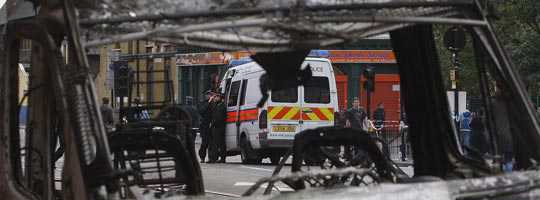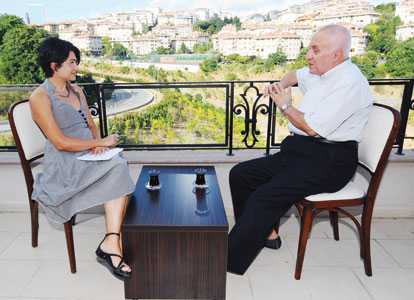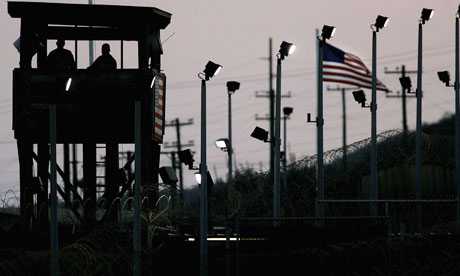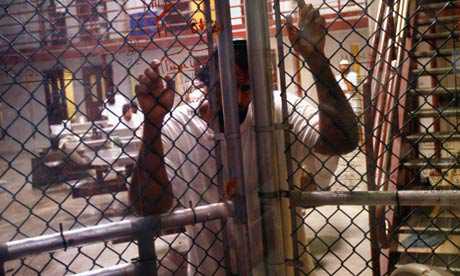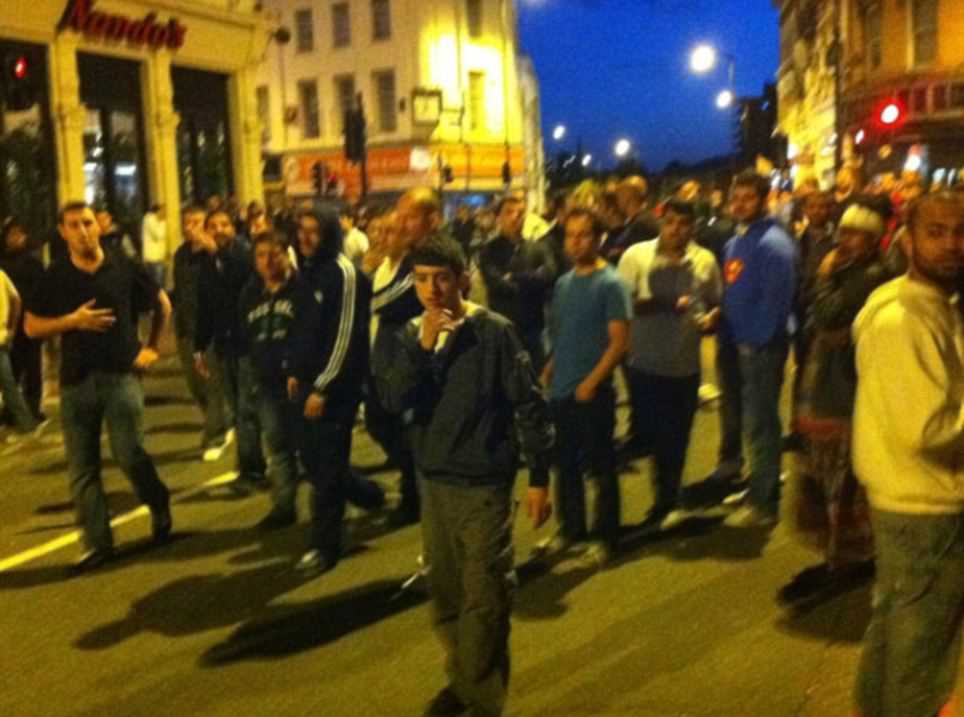 ‘We don’t do water cannon, we rely on consent’: May rules out tough action as vigilantes are forced to defend shops
‘We don’t do water cannon, we rely on consent’: May rules out tough action as vigilantes are forced to defend shops
Hundreds of Turkish shopkeepers take to the streets in north London to defend their businessesTheresa May: ‘We need robust policing but we also need to ensure that justice is done through the courts’Police cells in the capital are full after hundreds of arrests over three nights of riotingSenior officers complain Met police ‘rudderless’ since Sir Paul Stephenson left
Vigilantes were forced onto the streets last night to protect their homes and businesses after police failed to materialise at many of the scenes of looting and violence which swept across London.As officers lost control of the streets locals were forced to take the law into their own hands, arming themselves with sticks and chasing looters away from their properties.In Dalston and Hackney, north-east London, Turkish shopkeepers and their families fought back against looting youths, before spending the night standing shoulder-to-shoulder in an attempt to deter further attacks.One man said: ‘This is Turkish Kurdish area. They come to our shops and we fight them with sticks.’Despite increasing calls for the police to get tough with the rioters, Home Secretary Theresa May today sparked anger as she appeared to dismiss the notions that water cannons and even the Army could be used to ensure violent scenes are not repeated tonight.As police were slammed for appearing to let looters run riot under their noses, Mrs May instead advocated a more softly-softly approach.She said: ‘The way we police in Britain is not through use of water cannon. The way we police in Britain is through consent of communities.’
On Shacklewell Lane, the Turkish community was hailed across Twitter as being the force which saved the area from wanton destruction.After a single-deck bus was burned out, stick-wielding shopkeepers chased away a gang of youngsters before standing defiant in the face of further violence.One, who would not give his name, said: ‘We beat up four of them quite badly and they ran off.’ Another said: ‘This is not justice, coming here and trying to attack us.’ In testament to the men’s bravery, several businesses on the street remained open as usual, unlike other areas where shopkeepers had heeded police advice to shut their doors early.Guardian reporter Paul Lewis described the scenes on Kingsland Road, Hackney, as Turkish men clashed with youths, tweeting: ‘Kingsland Road chaotic as Turkish men attack other, predominantly black, youths with sticks, metal barricades and bricks.’
In a further tweet Mr Lewis quoted a man carrying a stick as saying: ‘This is Turkish Kurdish area. They come to our shops and we fight them with sticks.’South of the river in Tooting, near to Clapham, where high streets were ravaged, Asian shopkeepers shut up early and stood guard outside their stores with their relatives to protect them.A local resident, who asked not to be named, said: ‘With no police on the streets, it could’ve been a free-for-all for criminals. I’m so relieved it didn’t kick off round here last night. If it had kicked off I dread to think what would have happened.’Meanwhile, in Clapham, residents accused the police of ‘doing nothing’ to stop opportunistic looters pillaging the area’s high street. Shops including department Debenhams were stripped bare by rioters who arrived in cars which they filled with whatever items they could steal.
In spite of the fact that people were forced to take the law into their own hands to defend homes and businesses across the capital, Home Secretary Theresa May this morning seemed to rule out deploying the Army.David Cameron is now back in the capital after flying home early from Italy during the third night of horrific scenes with mobs burning buildings, looting shops and terrorising residents.The Prime Minister met with Mrs May and Acting Met Police chief Tim Godwin this morning before chairing a meeting of the Government’s emergency committee Cobra.Mrs May and Mayor of London Boris Johnson have also been forced to curtail their holidays and return as Scotland Yard battles to keep peace on the streets.Mrs May condemned the violence as ‘sheer criminality’ for which she said there was ‘no excuse’ but she downplayed suggestions the Army could be used to bolster police numbers.She said: ‘The disorder we’ve seen is at a level that hasn’t been seen for some years in this country. We do need to bring an end to it and we need to bring an end to it soon.”There is no excuse for these levels of criminality and it needs to be dealt with. These people need to see that there are consequences for their actions.’We need robust policing but we also need to ensure that justice is done through the courts and this will begin today.’She hailed the ‘strong leadership’ of the police as she called on local communities and parents to help efforts to keep the peace.Asked if the Army would be brought in, Mrs May said an end to the riots could be brought with policing, the use of intelligence and the help of local communities.’The way we police in Britain is not through use of water cannon,’ she said. ‘The way we police in Britain is through consent of communities.’She also urged parents to keep tabs on their children and for the support of local communities to help police do their jobs.Some 6,000 officers were on duty in London last night as more than 20,000 999 calls were made. A total of 13,000 will be working in the city over the next 24 hours.Mr Godwin has also called on all special constables – volunteer police officers – to come in to further bolster numbers. The FA has now cancelled tomorrow’s friendly between England and Holland at Wembley to avoid further stretching police.
More than 450 people have now been arrested since the violence first erupted on Saturday, with police cells across the capital now full. Three people were arrested last night on suspicion of attempting to kill a police officer.Commander Christine Jones, at Scotland Yard, said the events were ‘simply inexcusable’: ‘Ordinary people have had their lives turned upside down by this mindless thuggery.’Deputy Assistant Commissioner Stephen Kavanagh said all police leave has been cancelled and vowed ‘all able-bodied officers’ will be deployed. And he appeared to contradict the Home Secretary regarding the use of the Army by saying nothing had been ruled out.’The people of London need to know that the Commissioner and his management board team are considering everything and working through those options as we go forward,’ he said.
Residents questioned why no police officers were available to combat rampant looting as thieves methodically cleared stores. Up to 300 officers were drafted in from Home Counties forces to bolster the response but they were overwhelmed by the sheer scale of the rioting.Residents in Clapham, Croydon, Peckham and Hackney complained at the absence of police officers during the worst confrontations. In Clapham, Owen MacCarthy, 28, a bank worker, said: ‘It’s disgusting. These kids are out to loot as much as they can and they won’t stop until they’ve got everything.’I have seen people rob things then go home and come back for more. We’ve been here for an hour and half and we haven’t seen a single police officer and these kids have no idea between right and wrong.’In Peckham, onlookers said they feared for their lives as people struggled to get through to emergency services by phone and police took a long time to arrive. Staff in a branch of Tesco Metro described how they hid as masked looters rampaged through the shop stealing alcohol and food.The manager said: ‘I was locked inside my store for 45 minutes before the police came and let me out. We phoned them at seven o’clock and they didn’t come until eight. We locked ourselves in the office.’They kicked the door in and looted everything – it was terrifying. I didn’t even know what to do. I had my seven staff inside with me.’Former London Mayor advisor Atma Singh tweeted: ‘The image of London on TV is lawlessness. The police has a duty to stop the violence & criminals. No excuses for inaction. It’s appalling.’Met Police officer Pc Paul Deller was in the control room overnight co-ordinating the response and admitted the force was overstretched. It had to send out non-specialist officers to tackle the rioters because ‘the box was empty’ of reinforcements,’ he said.’We simply ran out of units to send. That’s not something we would normally expose those officers to a risk of, but last night decisions were made that we had to and that’s what we did. We threw everything we had at it,’ he told the BBC.However, he defended the police effort – insisting they were doing everything possible to restore calm. We didn’t surrender the streets. Over 50 of my colleagues were injured last night defending those streets to the best of their capability. I don’t think at any point did we surrender.’By midnight flashpoints had multiplied around London, with Clapham, Hackney, Dalston, Peckham, Woolwich and Lewisham added to the list which already included Enfield, Walthamstow and Tottenham.And there were fears that the chaos could spread nationwide, with Croydon to the south of the capital ablaze, and even Birmingham and Bristol joining in the destruction as hundreds of youths smashed shop windows and looted the contents.At 2.30am the Metropolitan Police changed tactics in the Lavender Hill area of Clapham, introducing armoured vehicles to push back more than 150 people where substantial damage was being caused to shops and local businesses.Because the tactic was a success police are now considering using the same tactic elsewhere.Commander Christine Jones, said: ‘We are using tactics flexibly to respond to the disorder we are still seeing in different areas of the capital. ‘Anyone involved in criminality should be under no illusion that we will pursue you. ‘We have been making arrests all evening and have a team working during the night examining CCTV images. ‘We will follow up evidence in the coming days in order to bring anyone else responsible for criminal acts to justice.’With cars, shops and homes burning, police tactics were coming under ever-increasing attack.Riot officers were unable to deal with the sheer scale of the violence and there were questions about the Metropolitan force’s lack of leadership following the resignation of Sir Paul Stephenson.The police lack of control allowed mobs of children aged as young as seven to rampage through the streets at will. Mobs of masked youngsters, some on BMXs, roamed the streets ransacking stores in daylight and hurling petrol bombs at police. At least 35 officers were hurt and tens of millions of pounds of damage was caused to homes and businesses in ‘copycat criminal activity’ across London.
Acting Metropolitan Police Commissioner Tim Godwin took the extraordinary step of appealing to parents whose children were running wild, telling them: ‘I do urge that parents start asking where they are.’David Cameron was forced to quit his holiday and fly back to chair an emergency summit this morning.The orgy of violence has its roots in the police shooting of suspected gangster Mark Duggan last Thursday.But by last night it had descended into ‘pure criminality’ and ‘thieving on a mass scale’.On another calamitous day for the capital, it emerged that:Some 334 arrests had been made, the youngest being a boy of 11;Police promised to track down the internet provocateurs who called on others to join the looting;Pamphlets were handed out advising thugs to burn clothes if caught on CCTV to evade capture.There were reports that Mark Duggan did not fire on police, but an officer shot him dead because he feared he was in danger from the gunman;It emerged that Duggan was armed with a blank-firing gun which had been converted to hold live ammunition;
Last night London was in lockdown as police lined the streets braced for violence led by ‘burglars, thugs and bullies’.Scotland Yard invoked special powers in four trouble hotspots – Lambeth, Haringey, Enfield and Waltham Forest – allowing officers to stop and search suspects without reasonable suspicion.But the move backfired when violence erupted in Hackney, East London in retaliation to the search operation.There, armed gangs on BMX bicycles attacked a crowded bus during the evening rush-hour and then chased the screaming commuters as they tried to escape.Riot police were forced to evacuate homes in the area. Screaming children were led to safety as cars and buildings continued to burn.
Police were unable to prevent the attacks because all the riot officers on the streets were caught up in running battles with gangs who pelted them with lumps of wood, chairs and bottles.The mob set fire to several buildings and three police cars. Witnesses reported seeing children aged as young as seven involved. They smashed the windows of stores, grabbing what they could before riot police arrived.Other thugs fought each other over a bag of diamonds which had fallen on to the street after it had been looted from a jewellers.A police officer could be seen lying on the ground after being struck on his shield by a missile.Other officers created a cordon around him while he was treated by colleagues.At one point child rioters tried to hijack a bus so they could drive it at police. As shop protective grilles were ripped up and a security camera smashed, two teenage girls giggled to each other, saying: ‘We’re gonna get gold!’There were also reports that white people were being targeted for robbery by gangs roaming the streets.
Police advised businesses across the capital to close as the violence also spread to Peckham, Deptford and Lewisham in South London.More than 300 officers from 12 outside forces were brought in to help the Met deal with riots. But areas of the capital were left entirely unprotected. In affluent Clapham, a 200-strong mob tore along the high street while one witness said: ‘There isn’t a single officer here.’Metropolitan Deputy Assistant Commissioner Stephen Kavanagh said Scotland Yard was on high alert and said the looting was ‘disgusting behaviour, ripping apart people’s livelihoods and businesses’.He said a third more officers were on the ground than Sunday night, which was three times more than Saturday when the riots started.
The Daily Mail

